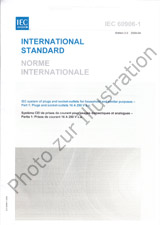Wir benötigen Ihre Einwilligung zur Verwendung der einzelnen Daten, damit Sie unter anderem Informationen zu Ihren Interessen einsehen können. Klicken Sie auf "OK", um Ihre Zustimmung zu erteilen.

IEC 60068-2-58-ed.4.1+Amd.1-CSV
Environmental testing - Part 2-58: Tests - Test Td: Test methods for solderability, resistance to dissolution of metallization and to soldering heat of surface mounting devices (SMD)
Name übersetzen
NORM herausgegeben am 28.7.2017
Informationen über die Norm:
Bezeichnung normen: IEC 60068-2-58-ed.4.1+Amd.1-CSV
Ausgabedatum normen: 28.7.2017
SKU: NS-1092353
Zahl der Seiten: 73
Gewicht ca.: 219 g (0.48 Pfund)
Land: Internationale technische Norm
Kategorie: Technische Normen IEC
Kategorie - ähnliche Normen:
Die Annotation des Normtextes IEC 60068-2-58-ed.4.1+Amd.1-CSV :
IEC 60068-2-58:2015+A1:2017 outlines test Td, applicable to surface mounting devices (SMD). This standard provides procedures for determining the solderability and resistance to soldering heat of devices in applications using solder alloys, which are eutectic or near eutectic tin lead (Pb), or lead-free alloys. The procedures use either a solder bath or reflow method and are applicable only to specimens or products designed to withstand short term immersion in molten solder or limited exposure to reflow systems. The solder bath method is applicable to SMDs designed for flow soldering and SMDs designed for reflow soldering when the solder bath (dipping) method is appropriate. The reflow method is applicable to the SMD designed for reflow soldering, to determine the suitability of SMDs for reflow soldering and when the solder bath (dipping) method is not appropriate. This edition includes the following significant technical changes with respect to the previous edition: - the addition of Sn-Bi low temperature solder alloy; - the addition of several reflow test conditions in Table 7 - Resistance to soldering heat - Test conditions and severity, reflow method; - introduction of reflow test method for Test Td3: Dewetting and resistance to dissolution of metallization; - implementation of guidance for the choice of a test severity in Clause B.3. This consolidated version consists of the fourth edition (2015) and its amendment 1 (2017). Therefore, no need to order amendment in addition to this publication. IEC 60068-2-58:2015+AMD1:2017 outlines test Td, applicable to surface mounting devices (SMD). This standard provides procedures for determining the solderability and resistance to soldering heat of devices in applications using solder alloys, which are eutectic or near eutectic tin lead (Pb), or lead-free alloys. The procedures use either a solder bath or reflow method and are applicable only to specimens or products designed to withstand short term immersion in molten solder or limited exposure to reflow systems. The solder bath method is applicable to SMDs designed for flow soldering and SMDs designed for reflow soldering when the solder bath (dipping) method is appropriate. The reflow method is applicable to the SMD designed for reflow soldering, to determine the suitability of SMDs for reflow soldering and when the solder bath (dipping) method is not appropriate. This edition includes the following significant technical changes with respect to the previous edition: - the addition of Sn-Bi low temperature solder alloy; - the addition of several reflow test conditions in Table 7 - Resistance to soldering heat - Test conditions and severity, reflow method; - introduction of reflow test method for Test Td3: Dewetting and resistance to dissolution of metallization; - implementation of guidance for the choice of a test severity in Clause B.3.
Empfehlungen:
Aktualisierung der technischen Normen
Wollen Sie sich sicher sein, dass Sie nur die gültigen technischen Normen verwenden?
Wir bieten Ihnen eine Lösung, die Ihnen eine Monatsübersicht über die Aktualität der von Ihnen angewandten Normen sicher stellt.
Brauchen Sie mehr Informationen? Sehen Sie sich diese Seite an.



 Cookies
Cookies
